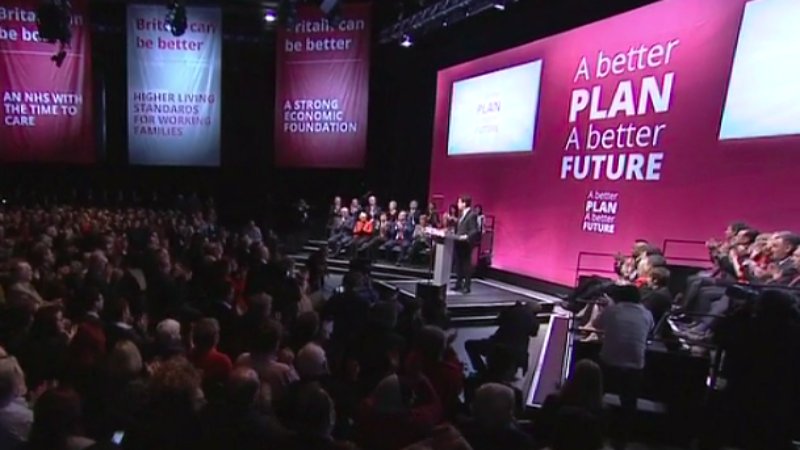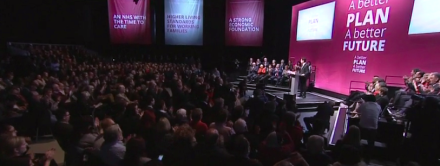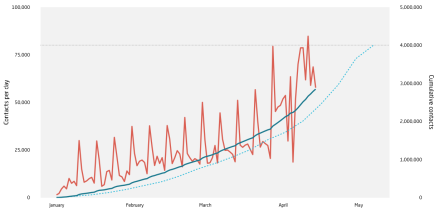
Here’s Douglas Alexander’s latest state of the race memo – which LabourList readers can read exclusively before anyone else. We’ll be posting these each week to give you a unique insight through the final weeks of the campaign.

Dear Friend,
**Winning the ground campaign**
This week felt like a crucial moment in this campaign so far. In last night’s debate, Ed Miliband showed he is the only alternative Prime Minister to David Cameron. And earlier this week, at Labour’s manifesto launch, he showed that only Labour has a plan to change this country. But at that launch, with the Shadow Cabinet sat behind him on stage and political journalist asking questions from the floor, Ed said something else that really struck me. He said “politics is too important to be left to politicians.” He was right.
On a personal level, this is one of the most important lessons I have taken from this campaign so far. But it is also one of the hardest to get your head around – especially during a national campaign when you are watching candidates for Prime Minister battle it out on TV, camera crews following MPs campaigning across the country or policy-heavy discussions about national manifesto launches.
But if politicians are the TV-face of this campaign, it is members, supporters and activists that are the literal face of the campaign in communities across the country. That is why the ground campaign we are running is not separate to our election strategy – it is an integral part of it. And since the start of the year, you have helped us achieve a campaigning record that we can all be proud of.
There is a chart on the wall of Labour HQ that I walk past every day that tracks our progress towards talking face-to-face to 4 million people before polling day. Since January, we have had nearly 3 million conversations and knocked on over 8 million doors – which means we are on course to meet our targets by the 7th May.
But we can’t for a moment think this election is already over. In 2010, around 35% of the electorate made up their mind in the last week of the campaign and nearly 20% were still undecided in the final 24 hours. But if back in 2010 our activists spoke to around half a million voters in those final weeks of the campaign, this time we are expecting to at least double that. I’ve worked on many general elections and we’ve never come close to achieving this scale of campaigning before. (Click to enlarge)
Our campaigning advantage is driven by a strong message but it is delivered on the back (sometimes literally) of our growing, energetic and passionate activist base. Our membership has been growing since 2010 and is way up on our original internal projections.
Since January our activist base has grown by around 2,500 a month and we have had over 10k new members join – double what we had in the same period in 2010. Our digital campaign is breaking new records with more than 91,000 volunteers recruited online since last April, with a daily average of 335 people this month alone, around half of whom are non-members.
At the same time, it is becoming clear that while the Tory party may have the cash, it just doesn’t have the campaigners. Since David Cameron took over, their party membership has halved and now has an average age of about 68.
But this is not just about a campaigning advantage, it is also a political dividing line. Because as Labour, we understand something the Tories never will. We know that progressive politics is about enabling voters to harness the power to deliver local and national change. It is about politicians working together with local people to show that when we come together, we can deliver real change for our communities. That is what will drive the next Labour government in the coming years – but it is also what is driving the Labour campaign over the coming weeks.
**Winning the air campaign**
In the heat of a general election as tight as this, you can see why some political parties get sucked into believing that the more radical you are in what you say, the more chance you have of getting your voice heard.
But as important as what you say, is what the voters actually hear. And being heard is not the same as being believed.
Voters today are listening out for the party that can offer real radicalism, but matched by genuine credibility. Because they know, even if not all the other parties seem willing to admit it, that in difficult financial circumstances your policies are only as strong as your plan for delivering them. And when trust is low and cynicism is high, your promises are worth only as much as your ability to stick to them.
So when we saw that the Tories had decided to use this crucial campaign week to put out what the FT described as a spending spree “large enough to raise concerns about the Tories’ commitment to their economic plan”, the mood in Labour HQ was genuinely incredulous.
It is a dramatic turn for a party of government to give up one of their most important, and unique, campaigning assets – to set the tax and spend baseline. Thinking back over all the campaigns I can remember, regardless of which party was in government, this has been a key advantage that no governing party has dared to squander.
And yet, when George Osborne took to the airwaves last weekend he was asked 18 times where the money will come from and 18 times he could not explain. The IFS dealt a further blow this week when they said the Tory manifesto launch showed the Tories “are going to have to do an enormous amount over the next three or four years, but almost no sense at all about actually how they are going to do it”.
Clearly the Tories feel under pressure and they can’t decide whether they want to be the party of the deficit or the party of sunny uplands and unfunded tax cuts. This week, they seemed to have settled on sacrificing credibility on the altar of opportunism in the hope it will give them the much promised ‘cross-over’ moment in the polls that has so far failed to materialise. I suspect not even Tory strategists know what next week will bring.
I think this goes to the heart of a deep strategic confusion that bedevilled the Tory campaign in 2010, and is doing so again this time around. At its root is the inherent tension that has always existed in Cameron’s leadership – a leader caught between what he believes and what he thinks he can say.
Labour has taken a different approach – and I believe our campaign has been strengthened because of it. Instead of a shopping list of new spending commitments, the very first page of our manifesto sets out our plan to secure the nation’s finances – with a Budget Responsibility Lock guaranteeing that every manifesto policy is paid for without a single penny of extra borrowing.
In these final weeks, days or hours of this campaign, we mustn’t let up, sit back or slow down. Instead, we have to work like our country’s future depends on it, because in these last weeks, it really does.
We know there is so much at stake. We know how far we have come. We know how close it is. And I know so much of that is down to you.
So thank you for everything you have done so far – and all that is still to come.
Best
Douglas





More from LabourList
‘Tackling poverty should be the legacy of Keir Starmer’s government’
‘The High Court judgment brings more uncertainty for the trans community’
‘There are good and bad businesses. Labour needs to be able to explain the difference’